What You Need To Know About Vitamin K2 – Discover 8 Amazing Benefits and the Recommended Daily Intake for Optimum Wellness
The Definitive Guide to Vitamin K2: Discover the Recommended Daily Intake for Optimum Wellness
Overview
Vitamin K2 also known as menaquinone is a lesser-known but crucial nutrient that plays a vital role in maintaining overall health and wellbeing. While many people are familiar with the more commonly known Vitamin K1, the benefits of Vitamin K2 are often overlooked. In this comprehensive guide, we will delve into the world of Vitamin K2, discussing its different types, comparing it to Vitamin K1, exploring its importance in the body, and uncovering its various health benefits. By the end, you will have a clear understanding of why menaquinone is essential for your overall wellness.
Understanding the different types of Vitamin K
Vitamin K is a fat-soluble vitamin that comes in two primary forms: Vitamin K1 (phylloquinone) and Vitamin K2 (menaquinone). While both types share similarities and contribute to the body’s overall health, they have distinct roles. Vitamin K1 is primarily involved in blood clotting and is found abundantly in leafy green vegetables. On the other hand, menaquinone has a wider range of functions and is found in animal-based foods and fermented products. It is important to note that Vitamin K2 is further classified into several subtypes, including MK-4 to MK-13, with each subtype having its own unique benefits.
Vitamin K2 vs Vitamin K1: What’s the difference?
Although both Vitamin K1 and Vitamin K2 are crucial for maintaining optimal health, they differ in terms of their absorption, distribution, and specific functions within the body. Vitamin K1 is readily absorbed by the liver and primarily supports blood clotting. It is essential for preventing excessive bleeding and ensuring proper wound healing. On the other hand, menaquinone has a longer half-life and is more effectively absorbed by extrahepatic tissues, such as bones, arteries, and tissues throughout the body. Menaquinone plays a vital role in regulating calcium metabolism, ensuring that calcium is properly utilized and deposited in the bones and teeth, while preventing its accumulation in the arteries and soft tissues.
The importance of Vitamin K in the body
Vitamin K is essential for a wide range of bodily functions, including blood clotting, bone metabolism, and cardiovascular health. Without sufficient Vitamin K, our bodies would struggle to form blood clots, leading to excessive bleeding and increased risk of hemorrhage. In addition, Vitamin K2 plays a crucial role in bone health by activating specific proteins that help deposit calcium in the bones, ensuring their strength and density. Furthermore, menaquinone helps to prevent the build-up of calcium in the arteries, reducing the risk of cardiovascular diseases such as atherosclerosis. By understanding the role of Vitamin K in our bodies, we can appreciate the importance of maintaining adequate levels of this vital nutrient.
Health benefits of Vitamin K2
Vitamin K2 is associated with a myriad of health benefits that contribute to overall wellbeing. One of the key benefits of Vitamin K2 is its role in promoting optimal bone health. By activating proteins that control calcium metabolism, menaquinone helps to prevent osteoporosis, improve bone mineral density, and reduce the risk of fractures.
Additionally, Vitamin K2 has been shown to support heart health by preventing the calcification of arteries, which can lead to arterial stiffness and cardiovascular diseases. Furthermore, studies have suggested that menaquinone may have a positive impact on dental health by promoting proper tooth development and preventing tooth decay. Lastly, emerging research indicates that menaquinone may play a role in brain health, potentially reducing the risk of neurodegenerative diseases such as Alzheimer’s.
Recommended Daily Intake of Vitamin K2
While there is no official Recommended Daily Intake (RDI) for Vitamin K2, experts recommend a daily intake of around 100-200 micrograms (mcg) for adults. It is important to note that individual needs may vary based on factors such as age, gender, and specific health conditions. To ensure you are getting an adequate amount of Vitamin K2, it is advisable to incorporate food sources rich in this nutrient into your diet or consider supplementation. Consulting with a healthcare professional can provide personalized guidance on the appropriate daily intake of menaquinone for your specific needs.
Food sources rich in Vitamin K2
Vitamin K2 can be obtained through both dietary sources and supplementation. Some of the best food sources of menaquinone include fermented foods like natto, sauerkraut, and kefir, as well as animal-based products such as egg yolks, liver, and cheese. Additionally, certain types of fish, such as salmon and sardines, are also good sources of Vitamin K2. By including these foods in your diet, you can ensure a sufficient intake of menaquinone and reap its numerous health benefits.
Fermented foods like natto, cheese, and certain meat products are rich sources of menaquinone. If these foods aren’t a regular part of your diet, you can also consider vitamin K2 supplements.
Vitamin K2 is primarily found in animal-based and fermented foods. Here are some examples of foods that contain menaquinone, along with approximate amounts per 100-gram serving:
- Natto: Natto is a Japanese dish made from fermented soybeans and is one of the richest sources of vitamin K2, particularly menaquinone-7 (MK-7). A 100-gram serving of natto can contain up to 1000 micrograms (mcg) of MK-7.
- Cheese: Certain types of cheese, such as Gouda, Brie, and Edam, are good sources of vitamin K2. A 100-gram serving of these cheeses can provide between 10 and 75 mcg of vitamin K2, depending on the type and aging process.
- Egg Yolks: Egg yolks contain a small amount of menaquinone, specifically MK-4. A single large egg yolk provides approximately 0.5 to 1 mcg of vitamin K2.
- Meat: Animal-based meats, particularly organ meats like liver, are sources of vitamin K2. A 100-gram serving of cooked beef liver, for example, can contain around 5-10 mcg of vitamin K2.
- Fermented Foods: Some fermented foods, apart from natto, may contain small amounts of menaquinone. Sauerkraut and kimchi, for instance, provide trace amounts of menaquinone due to the fermentation process.
It’s worth noting that the vitamin K2 content in foods can vary depending on factors like food processing and animal diet. To ensure an adequate intake of menaquinone, it may be necessary to incorporate a variety of these foods into your diet or consider menaquinone supplements, especially if dietary sources are limited.
Please keep in mind that individual dietary needs can vary, and it’s advisable to consult with a healthcare provider or registered dietitian to determine the most appropriate dietary strategy for your specific health goals and requirements.
Supplementing with Vitamin K2
In some cases, it may be challenging to obtain enough menaquinone solely through diet. This is where supplementation can play a valuable role. When choosing a Vitamin K2 supplement, it is important to opt for a high-quality product that contains the bioactive form, such as MK-7. Activation Products’ Perfect K2D3 is a premium supplement that combines Vitamin K2 with Vitamin D3, another essential nutrient for bone and immune health. By incorporating this supplement into your daily routine, you can ensure you are getting an adequate amount of both Vitamin K2 and Vitamin D3 for optimal wellness.
How to take in Vitamin K2
The best way to take menaquinone can vary depending on individual needs and dietary habits. Here are some general guidelines, supported by references:
- Dietary Sources: Incorporating foods rich in menaquinone into your daily diet is one of the most natural ways to ensure adequate intake. Some food sources of menaquinone include natto, cheese (particularly Gouda and Brie), egg yolks, and meat (especially organ meats like liver).
- Fermented Foods: Fermented foods like natto and certain types of cheese can be excellent sources of vitamin K2. Including these foods in your diet may provide a consistent source of this nutrient.
- Supplements: If you have difficulty obtaining sufficient vitamin K2 from dietary sources or have specific health concerns, supplements can be considered. Menaquinone-7 (MK-7) is a commonly available and well-absorbed form of vitamin K2 in supplement form. I take Activation Products’ Perfect K2D3.
- Combination Supplements: Some supplements combine vitamin K2 with other vitamins and minerals, such as vitamin D and calcium, which can be beneficial for overall bone health and calcium metabolism.
- Consultation with a Healthcare Provider: Before starting any new supplementation, it’s essential to consult with a healthcare provider, such as a doctor or registered dietitian. They can assess your specific nutritional needs and help you determine the most appropriate form and dosage of menaquinone based on your health goals and any underlying medical conditions.
The choice of how to take vitamin K2 should be tailored to your individual circumstances and health objectives. A healthcare provider can provide personalized guidance based on your unique requirements.
The role of Vitamin K2 in bone health
One of the key functions of Vitamin K2 is its role in maintaining optimal bone health. By activating proteins that regulate calcium metabolism, menaquinone helps to ensure proper bone mineralization and prevent the loss of bone density. This is particularly important as we age, as bone density naturally decreases over time. Studies have shown that individuals with higher levels of menaquinone have a reduced risk of fractures and osteoporosis. By incorporating Vitamin K2-rich foods or supplements into your diet, you can support your bone health and reduce the risk of future complications.
Vitamin K2 and heart health
Vitamin K2 has gained attention for its potential cardiovascular benefits. By preventing the calcification of arteries, menaquinone helps to maintain their flexibility and integrity, reducing the risk of arterial stiffness and cardiovascular diseases such as heart attacks and strokes. Research suggests that higher levels of menaquinone may be associated with a decreased risk of coronary artery disease. By prioritizing Vitamin K2-rich foods or supplements, you can support your heart health and promote overall cardiovascular wellbeing.
Vitamin K2 and dental health
Maintaining good dental health goes beyond regular brushing and flossing. Vitamin K2 has been linked to dental benefits, particularly in the development and maintenance of healthy teeth. By activating proteins that promote the deposition of calcium in the teeth, Vitamin K2 helps to strengthen enamel and prevent tooth decay. Additionally, menaquinone may play a role in reducing the risk of periodontal disease, a condition that affects the gums and supporting structures of the teeth. By ensuring an adequate intake of menaquinone, you can support your dental health and maintain a beautiful smile.
Vitamin K2 and brain health
Emerging research suggests that menaquinone may have a positive impact on brain health and cognitive function. Studies have indicated that individuals with higher levels of menaquinone have a reduced risk of neurodegenerative diseases, such as Alzheimer’s. menaquinone’s role in preventing calcium accumulation in the brain may contribute to its potential neuroprotective effects. While more research is needed to fully understand the relationship between menaquinone and brain health, incorporating Vitamin K2-rich foods or supplements into your diet may offer benefits for cognitive wellbeing.
Additional Benefits of Vitamin K2

- Skin Health: Menaquinone may play a role in promoting skin health. It has been suggested that this vitamin can help reduce the appearance of wrinkles and promote skin elasticity. Some skincare products also include menaquinone for its potential benefits in skin rejuvenation.
- Anti-Inflammatory Effects: Vitamin K2 may possess anti-inflammatory properties that could be beneficial for individuals dealing with chronic inflammatory conditions. Some studies suggest that it helps reduce inflammation markers in the body.
- Cancer Prevention: There is emerging evidence that vitamin K2 might play a role in cancer prevention, particularly in reducing the risk of certain cancers, such as prostate cancer. However, more research is needed in this area.
- Hormonal Balance: Some studies have suggested that vitamin K2 may support hormonal balance in women during menopause. It may help reduce the risk of bone loss and fractures associated with hormonal changes.
While these potential benefits of menaquinone are promising, it’s important to note that research in some areas is still ongoing, and more evidence is needed to establish causal relationships. Additionally, individual responses to vitamin K2 may vary, and its benefits should be considered in the context of an overall balanced diet and healthy lifestyle.
Before making significant changes to your dietary or supplementation regimen, it’s advisable to consult with a healthcare provider to ensure that it aligns with your specific health needs and goals.
Top of Form
Potential side effects and precautions of Vitamin K2
While Vitamin K2 is generally safe for most individuals, it is important to exercise caution, especially if you have certain health conditions or are taking specific medications. Individuals on blood-thinning medications, such as warfarin, should consult with their healthcare provider before increasing their Vitamin K2 intake, as it may interfere with the medication’s effectiveness. Additionally, those with specific medical conditions, such as liver disease or gallbladder problems, should seek medical advice before supplementing with menaquinone. As with any supplement, it is always advisable to consult with a healthcare professional before making any changes to your diet or supplementation routine.
Final Thoughts: Optimize your wellness with Vitamin K2
Vitamin K2 is a vital nutrient that plays a crucial role in maintaining optimal health and wellness. From supporting bone health and cardiovascular function to promoting dental and brain health, menaquinone offers a wide range of benefits. By ensuring an adequate intake of menaquinone through diet or supplementation, you can optimize your overall wellness and reduce the risk of various health complications. Activation Products’ Perfect K2D3 is a premium supplement that combines Vitamin K2 with Vitamin D3, offering comprehensive support for your bone, heart, and immune health. Take charge of your wellbeing and embrace the power of Vitamin K2 to live your best and healthiest life.
To experience the benefits of Vitamin K2 and Vitamin D3 for optimal wellness, try Activation Products’ Perfect K2D3 today!
For natural and healing remedies, products, and supplements to help you live your most optimal healthy life, visit our store here!
Own Your Health!
If you enjoyed the information presented in this article, Please Share It and help us reach more people and keep this website going! Thank you!
Disclaimer: The information provided in this article is for informational purposes only and should not be considered as medical advice. Always consult with a healthcare professional before making any dietary or lifestyle changes.
References
Schurgers LJ, Teunissen KJ, Hamulyák K, et al. Vitamin K-containing dietary supplements: comparison of synthetic vitamin K1 and natto-derived menaquinone-7. Blood. 2007;109(8):3279-3283.
Gijsbers BL, Jie KS, Vermeer C. Effect of food composition on vitamin K absorption in human volunteers. Br J Nutr. 1996;76(2):223-229.
Beulens JW, Booth SL, van den Heuvel EG, et al. The role of menaquinones (vitamin K₂) in human health. Br J Nutr. 2013;110(8):1357-1368.
The National Nutrient Database for Standard Reference, United States Department of Agriculture (USDA).
Schurgers LJ, Vermeer C. Determination of phylloquinone and menaquinones in food. Effect of food matrix on circulating vitamin K concentrations. Haemostasis. 2000;30(6):298-307.
Booth SL, Suttie JW. Dietary intake and adequacy of vitamin K. J Nutr. 1998;128(5):785-788.
Holick MF. Vitamin K and vitamin D status: associations with inflammatory markers in the Framingham Offspring Study. Am J Epidemiol. 2009;170(8):1032-1039.
Geleijnse JM, Vermeer C, Grobbee DE, et al. Dietary intake of menaquinone is associated with a reduced risk of coronary heart disease: The Rotterdam Study. J Nutr. 2004;134(11):3100-3105.
Rheaume-Bleue K. Vitamin K2 and the Calcium Paradox: How a Little-Known Vitamin Could Save Your Life. HarperCollins; 2011.
Knapen MH, Braam LA, Drummen NE, et al. Menaquinone-7 supplementation improves arterial stiffness in healthy postmenopausal women. Thromb Haemost. 2015;113(5):1135-1144.
Presse N, Shatenstein B, Kergoat MJ, et al. Dietary vitamin K and therapeutic warfarin alter the susceptibility to vascular calcification in experimental chronic kidney disease. Kidney Int. 2015;87(6):1177-1186.
Shiratori T, Miyata T, Yahagi N, et al. Vitamin K2 (menatetrenone) effectively prevents fractures and sustains lumbar bone mineral density in osteoporosis. J Bone Miner Res. 2000;15(3):515-521.
Shea MK, O’Donnell CJ, Hoffmann U, et al. Vitamin K supplementation and progression of coronary artery calcium in older men and women. Am J Clin Nutr. 2009;89(6):1799-1807.
Nimptsch K, Rohrmann S, Linseisen J. Dietary intake of vitamin K and risk of prostate cancer in the Heidelberg cohort of the European Prospective Investigation into Cancer and Nutrition (EPIC-Heidelberg). Am J Clin Nutr. 2008;87(4):985-992.
Maresz K. Proper Calcium Use: Vitamin K2 as a Promoter of Bone and Cardiovascular Health. Integr Med (Encinitas). 2015;14(1):34-39.
Kanellakis S, Moschonis G, Tenta R, et al. Changes in parameters of bone metabolism in postmenopausal women following a 12-month intervention period using dairy products enriched with calcium, vitamin D, and phylloquinone (vitamin K(1)) or menaquinone-7 (vitamin K (2)): the Postmenopausal Health Study II. Calcif Tissue Int. 2012;90(4):251-262.
Theuwissen E, Smit E, Vermeer C. The role of vitamin K in soft-tissue calcification. Adv Nutr. 2012;3(2):166-173.

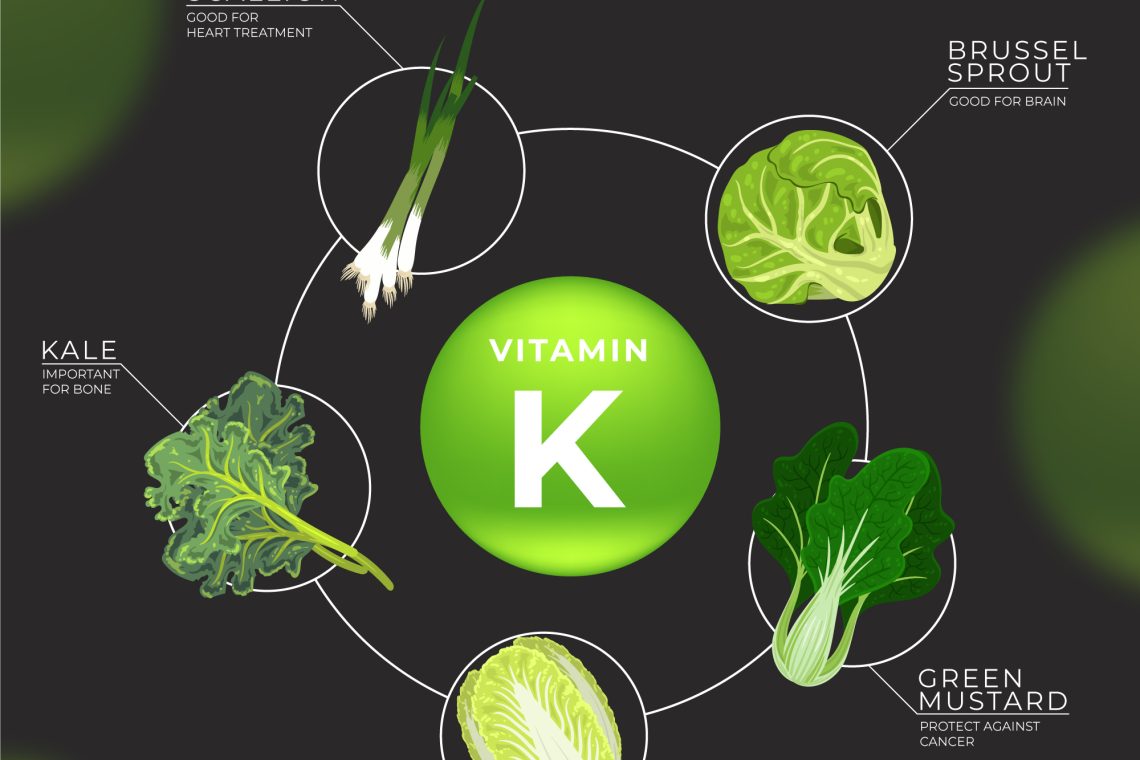
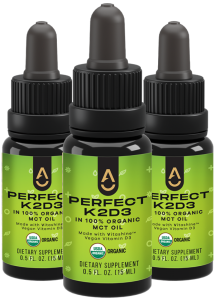


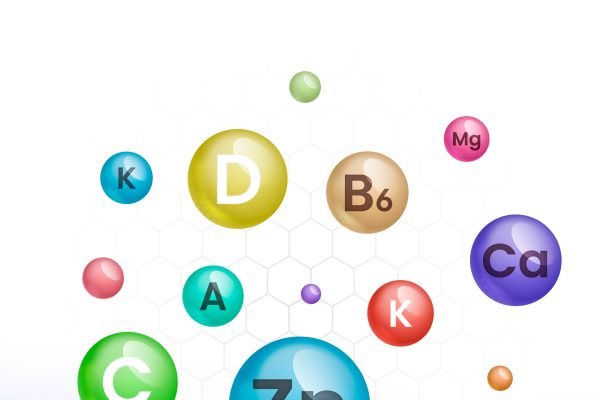





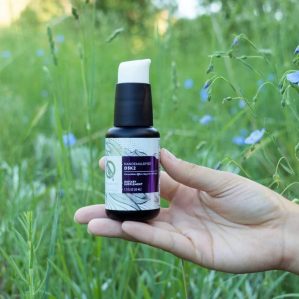
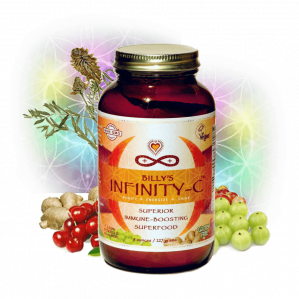
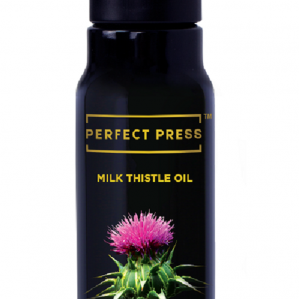
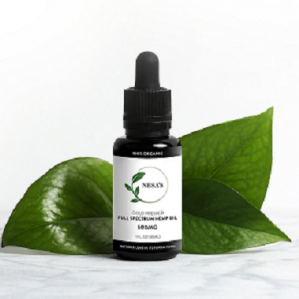












1 Comment
[…] Vitamin Therapies, also known as intravenous vitamin therapies, involve the administration of essential vitamins, minerals, and other nutrients directly into the bloodstream. Unlike traditional oral supplements, […]